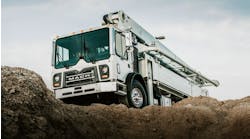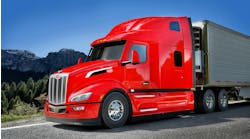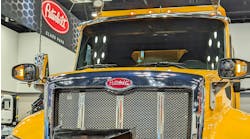New emissions regulations and a corresponding proliferation of power options have helped to make the need for close collaboration between equipment suppliers and their customers as well as truck OEMs more critical than ever, said Doug Lenz, director of global product management for Thermo King. “We have to work together in order to “get the equipment specified right from the beginning,” he said.
Lenz stated that flexibility and optimization are watchwords at Thermo King, which manufactures reefer units and APUs. “That means focusing on better asset management, energy efficiency and application optimization,” he stressed.
Lenz was among several executives from Thermo King and four fleet customers who gave presentations and fielded questions from the media at a transportation efficiency program hosted by Thermo King last week at its Bloomington, MN, headquarters. The speakers discussed such topics as regulatory trends and challenges-- including the arrival of more non-diesel power options for reefers and APUs-- the important role of collaboration between suppliers, customers and vehicle makers worldwide; the emerging trend toward outsourcing of maintenance, training and monitoring; and innovations to improve energy and operational efficiency.
Lenz went on to talk about non-diesel solutions for powering reefers and other onboard systems, including “shore power,” which provides plug-in access to AC electricity; auxiliary power units (APUs); alternative fuels and other alternative methods for driving refrigeration units, such as using the truck’s PTO for power.
Many trucking companies today need to be “seen as green,” Lenz also pointed out, and so have implemented sustainability initiatives to achieve their goals. Regulations are pushing this trend, he added, citing the Food & Drug Administration’s (FDA) Sanitary Food Proposal and similar measures under consideration in Europe.
“When it comes to refrigeration units,” Vic Maret, vp, sales North America for Thermo King said, “we have to work together to get the equipment specified right from the beginning. “Customers care about set temperature, out of route miles and maintenance issues, which they want to address before they become a problem.” They are also concerned about food safety, he noted, as well as related regulations and pending regulations. The challenge, he added, is “how do we make a [reefer] unit that is truly flexible?”
Martin Duffy, vp of global bus and rail heating, ventilation and air conditioning, gave the audience a look at all-electric reefers. These are designed to be used on straight trucks, such as small vans; hybrid trucks that can use power from the vehicle’s battery pack to operate reefer units; unattended refrigerated rail containers/trailers that can be monitored and temperature-adjusted remotely, and the new SLX Whisper reefer unit for trailers, designed for Europe where noise restrictions and size limitations can be very stringent.
It is not all about hardware, however, Duffy pointed out. “Support services are huge,” he said, “and an area where we see significant growth. It is all about certainty.”
According to Duffy, training is one of the Thermo King’s greatest assets and something they do not compromise on. “It has a huge long-term value for the customer,” he said. The Bloomington facility alone is suggestive of the company’s commitment to training. More than 10,000 visitors come to the facility every year, most for hands-on training on products.
Thermo King customers also joined in, sharing information about their own operations. D&D Sexton, Inc., Marten Transport, bus maker New Flyer, and the Twin Cities Metro Transit all discussed their own initiatives to go green.
David (Dean) Sexton, founder of D&D Sexton, for example, shared a long list of fuel-saving changes he has made within his company. “Being green is very important to us,” he said. “We are a member of the EPA SmartWay partnership and conserving fuel is our major focus.”
To help meet their fuel economy goals, D&D Sexton has:
- Moved to single wide-base tires on tractors and trailers
- Implemented an automated tire inflation system,
- Added a suite of aerodynamic devices
- Optimized vehicle idle
- Moved to synthetic lubes
- Changed gear ratio specs for top performance
- Governed truck engines at 65 mph
- Changed to Teflon plates on fifth wheels
- Switched to LED lighting
“It is important to adopt new technologies,” Sexton observed. “You just don’t want to get too far behind.”


